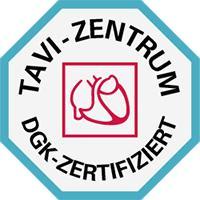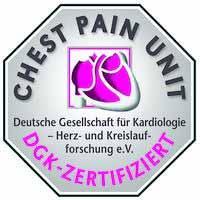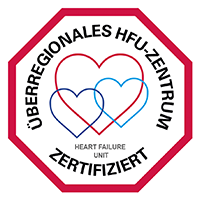Unfortunately, mortality from heart diseases is high in many countries today. German doctors have long and thoroughly studied all types and possible complications of angina. Therefore, for patients with diagnosed angina pectoris, treatment in Germany is most likely to bring positive results.
Content
- Overview
- Causes of angina
- Unstable angina
- Diagnostics of angina in hospitals in Germany
- Principles of angina treatment in Germany
- Angioplasty
- Preventive measures for angina pectoris
- Why undergo angina treatment in German hospitals?
- How much does the treatment of angina in Germany cost?
- How to start treatment in Germany?
Overview
Angina pectoris (heart attack) is a type of coronary heart disease in which, as a result of a disorder of the cardiovascular system, the blood flow to the heart muscle is impaired. This disease is usually characterized by acute pain in the retrosternal space, which may extend to the left arm, neck, or jaw. Gradually, the pain may spread to the shoulder blades and the right side of the body. Moreover, angina attacks may be accompanied by severe headaches, vomiting, slowed pulse, tachycardia, and increased blood pressure.
To date, there are several groups of factors that can provoke the occurrence of this disease, including:
- Heredity aspect and the age of the patient.
- The presence of serious diseases such as, for example, diabetes and other autoimmune diseases, coronary artery inflammation, atherosclerosis, and others.
- A stagnant lifestyle that includes the presence of smoking, alcohol abuse, poor diet, sedentary lifestyle, etc.
A sudden attack of angina may occur as a result of excessive physical activity or overexertion with insufficient blood supply to the heart muscle. Similar symptoms are observed with severe spasms of the coronary vessels, which may occur as a result of severe stress or nervous tension, as well as abuse of smoking.
Causes of angina
The causes of heart pain can be extremely varied, since there are many structures located in the mediastinum. Angina pectoris, also leading to myocardial infarction in its acute form, can be considered one of the most widespread diseases with symptoms of heart pain. It is a temporary decreased blood supply (ischemia) to the myocardium that is responsible for this. The pathological process often happens due to the narrowing of the coronary arteries of the heart by thickened fatty accumulations (plaques or arteriosclerosis) on the vessel walls. An acute attack of angina usually lasts for a few seconds, but in severe cases, it can last for several minutes. It occurs due to physical or mental stress.
A distinction is made between exercise-induced angina (stable angina) and unstable angina occurring at rest. The latter should be monitored in a hospital setting, because such manifestation may pose a risk of acute myocardial infarction.
The typical symptoms of an acute angina attack are:
- Squeezing or burning, pressure, or compression behind the sternum with recurring pain in the back of the neck, neck, jaw, arms, or upper abdomen.
- Discomfort or numbness in the arm, shoulder, elbow, or hand (often on the left side).
- Sudden shortness of breath.
- Nausea, vomiting.
- Profuse sweating.
- Squeezing feeling in the neck.
- Panic attack or fear of suffocation.
Unstable angina
The main cause of angina destabilization is the development of thrombosis preceded by plaque in clogged vessels that is being ruptured or gradually destroyed. More often rupture happens when the plaque is eccentrically located, has a mobile, "growing" lipid core (occupying more than 50% of its volume), as well as when it is covered by thin connective tissue, or contains a large number of macrophages and T-lymphocytes. Plaque tearing and rupture are promoted by whether plaque oxidation, significant blood flow pressure on the plaque edges, smoking, pronounced blood pressure increase, or intense physical activity. Then the process of intracoronary thrombosis is started.
But with this health condition, there are not enough biological signs of myocardial necrosis sufficient for a medical diagnosis of myocardial infarction.
If angina occurs at unpredictable levels of physical activity, like an unstable angina does, it is necessary to limit the load to a minimum for a few days and consult the attending physician: more active treatment and, possibly, hospitalization will be required. An episode of unstable angina can end in myocardial infarction. When chest pain persists and it is difficult to make a diagnosis, the term "acute coronary syndrome" is used.
An acute coronary syndrome associated with angina is any group of clinical signs or symptoms suggestive of myocardial infarction. The condition implies ST-segment elevation myocardial infarction diagnosed by enzyme changes, by biomarkers, by late ECG signs and the detected unstable angina. The term appeared due to the need to choose therapeutic tactics before the final diagnosis of the listed conditions. It is used to refer to patients on the first contact and implies the need to treat patients with myocardial infarction or unstable angina pectoris.
Diagnostics of angina in hospitals in Germany
The diagnostics of angina in hospitals in Germany is particularly thorough, since this seemingly not so severe cardiovascular disease can progress very quickly. This may result in the development of other more serious health conditions, leading to disability, complete or partial paralysis, and even death of the patient.
The medical diagnosis of chest pain is usually made based on the symptoms and their accompanying circumstances. However, many doctors also prefer additional tests, such as electrocardiography (which is performed both at rest and stress), coronary artery X-rays, MRI, and CT scanning. If necessary, doctors prescribe coronography, which is one of the most precise methods of cardiovascular diagnostics in the German hospitals.
This simple procedure involves inserting a catheter into the femoral or ulnar artery, through which an X-ray contrasting substance enters the vessels. With a special imaging device, the doctor can see a complete picture of the state of the vessels, places of accumulation of cholesterol plaques, thinning and protrusion of their walls (aneurysms), and other deformations.
Principles of angina treatment in Germany
Angina pectoris treatment in Germany is usually carried out in specialized hospitals. After the establishment of an accurate medical diagnosis, the attending physician selects a treatment program individually for each patient. In the absence of serious pathology in the case of angina pectoris, conservative treatment is prescribed in the form of drug treatment that includes the use of nitroglycerine, blood pressure medicines, antiarrhythmic drugs, calcium channel blockers, diuretics, vitamins, etc.
Not all patients are susceptible to conservative therapy, which often causes many side effects and is contraindicated in some clinical cases. If medications are not enough, specialists recommend surgical treatment in the form of angioplasty and/or stenting, or coronary bypass surgery.
As for unstable angina, with competent treatment, it is possible to achieve the disappearance of unstable signs and its transition to a stable form.
The treatment tactics in this case include pain management and control over the occurrence of heart attack. The patient is indicated medication to eliminate blood clotting, beta-blockers for lipid plaques, and heparins. Among surgical methods, prosthetic repair and endovascular surgery are most commonly used. The patient is prescribed angioplasty, stenting, or coronary bypass surgery when indicated.
Competent and correctly chosen treatment tactics will help to control the state of the cardiovascular system and prevent the development of more severe forms of the disease. Hospitalization is indicated for all patients, regardless of the type of angina. Inpatient treatment, even in cases where drug therapy has been chosen, allows doctors to conduct a comprehensive examination and monitor its effectiveness.
After discharge from the hospital, all risks and negative factors that may provoke the disease should potentially be eliminated.
Angioplasty
Angioplasty is a minimally invasive surgical procedure that was originally developed as an alternative to coronary artery bypass surgery (CABG).
Cardiac angioplasty was first performed in the 1970s, but soon enough the number of angioplasty procedures began to exceed the number of CABG surgeries.
Angioplasty refers to the mechanical restoration of the patency of arterial vessels, which is performed by injecting air into a special balloon. Loose atherosclerotic deposits are squeezed and pressed against the vessel walls, as a result, the vessel is mechanically freed and blood permeability of the vessel is restored.
However, it was soon noticed that with time the vessel dilated by balloon angioplasty becomes clogged again. Therefore, cardiac surgeons began to practice stenting, i.e. implantation of special dilators in their cavity, which holds the walls of the vessel in the proper position.
Today, the widespread use of angioplasty and stenting significantly lowers the mortality rate from cardiovascular diseases, including myocardial infarction, halts the development of atherosclerotic changes, prevents the development of heart failure, and significantly improves the quality of life by eliminating excruciating attacks of angina pectoris.
Preventive measures for angina pectoris
The following recommendations can be crucial in balancing the strain on your heart and avoiding cardiovascular disease:
- Regular exercises. Exercise under heart rate control within the heart load limits authorized by your physician, depending on your medical diagnosis and age.
- Eating healthy nutrient-dense foods. Obesity and hypercholesterolemia are major factors leading to fatty deposits on the walls of blood vessels, which can cause heart attacks or strokes. Unsaturated Omega-3 and Omega-6 fatty acids, which can be found in cold-pressed oils, fish, nuts, and avocados help lower cholesterol levels and thus prevent arteriosclerosis. If you are currently struggling with weight, try switching to a healthier diet and establish an exercise routine suitable to your health condition.
- Try to lower your stress levels. Allow yourself breaks while you work, and practice breathwork from time to time. A huge to-do list, as well as the habit of doing several things at once, can facilitate a chronically rapid heartbeat, as well as high blood pressure.
- Try to stop smoking and lower your alcohol intake.
If you suffer from angina pectoris, established by examinations, you should avoid mentally exhausting situations and extreme sports, which are accompanied by a large release of adrenaline. You should also avoid various types of competitions.
Why undergo angina treatment in German hospitals?
All recommended hospitals in Germany are among the world-class specialized centers equipped with state-of-the-art technology. Consistent and widespread use of minimally invasive techniques during treatment in Germany has significantly reduced the number of complications after treatment of angina pectoris and the length of hospital stay.
The equipment for sparing surgical treatment of angina pectoris currently available in German hospitals allows achieving results comparable to those obtained during conventional surgical intervention with minimal complications and unwanted aftereffects.
You are welcome to learn more information about the mentioned German hospitals on the Booking Health website.
How much does the treatment of angina in Germany cost?
The cost of treatment in Germany depends on the chosen treatment technique for angina pectoris, by the necessity of diagnostic and rehabilitation.
Patients from other countries usually come to Germany with an already established medical diagnosis. In such cases, you should take all available medical documents with you and, at the same time, be prepared for the fact that some tests will have to be repeated to verify the diagnosis.
The experience of German cardiac surgeons in the verification of diagnoses of patients from other countries shows that doctors often make mistakes both in the area of establishing the diagnosis of the disease and in the choice of the treatment method.
- The prices for angina diagnostics start at 482 EUR.
- The cost of treatment with percutaneous transluminal coronary angioplasty starts at 2,862 EUR.
- The prices for cardiac rehabilitation start at 566 EUR.
Please contact Booking Health for the information about the cost of treatment in your clinical case.
How to start treatment in Germany?
Booking Health has been organizing treatment of heart diseases in Germany for years. Therefore, the journey of patients undergoing thorough and accurate examinations, and further necessary therapeutic and recovery measures in Germany is confirmed to be safe and effective.
The hospitals in Germany that specialize in cardiac surgery, which Booking Health cooperates with, offer the full spectrum of outpatient and inpatient medical services in the field of cardiology and related fields of medicine, through the cooperation of doctors of different specializations.
If you would like us to start establishing the type of program of treatment for you or you want to learn more information about the cost of treatment in your clinical case, please fill in the request on the Booking Health webpage, and we will contact you as soon as possible.
Authors: Dr. Nadezhda Ivanisova, Dr. Sergey Pashchenko



















